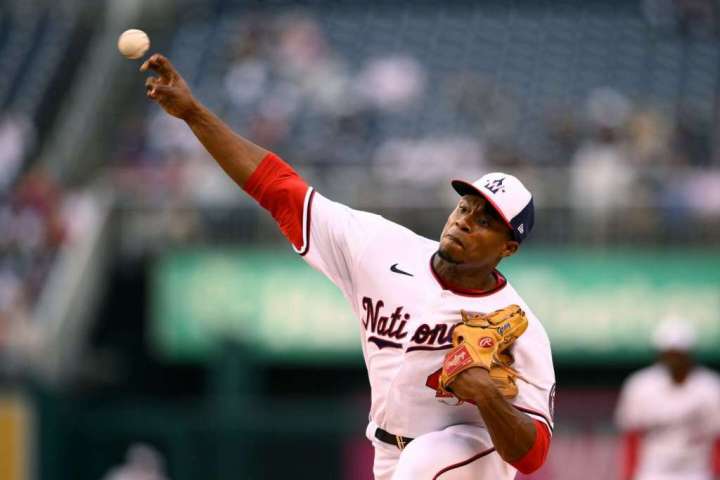On Tuesday night, Josiah Gray was a flyball pitcher — one who couldn’t finish tough hitters or keep the ball in the yard — and had a few narratives attached to what would have been the normal course of his growth and development if he were facing any other team.
Josiah Gray lasts only three innings as Nationals fall to Dodgers

The second: Trea Turner, one of the stars Gray was traded for in July, took the 24-year-old righty deep for a two-run homer in the first, inducing equal doses of groans and cheers at Nationals Park.
The third: None of this helped ease the fans’ frustration watching Turner return with a first-place team that twice has sprinted past the last-place Nationals (14-30) this week.
“There were a lot of emotions, and being traded twice already, I guess this was my first opportunity to prove myself against a former team,” Gray said after Washington tied the Cincinnati Reds with an MLB-high 30 losses. “So I obviously let the emotions get ahead of me and didn’t control them from the first pitch on. But, yeah, the emotions were there, kind of just wanting to prove to them like, ‘Hey, you guys are missing out.’ But unfortunately the outing didn’t go my way.”
Why was it so important to show that to the Dodgers?
“I think that’s just the type of player I am,” Gray answered. “In being slighted, I guess you could say, since I’ve been in pro ball, I’ve wanted to prove my former organizations wrong and that they traded a guy who is going to go out there and work his butt off.”
Since most narratives pass, what mattered in Gray’s 22nd major league start is that he took a tough test, learned from it and has to be sharper with his fastball, especially with a stacked lineup such as that of the Dodgers and especially in two-strike counts.
In the first, Turner crushed his two-run shot on a 2-2 fastball at the outer edge of the plate. In the second, Mookie Betts pulled a three-run homer on a 1-2 slider that was low and in. And in the third, Chris Taylor rocked his two-run homer on a 2-2 fastball intended for the outer half. The pitch leaked toward the heart of the zone, and Taylor didn’t miss it.
The Dodgers (29-13) were quick to overcome the Nationals’ three-run first against Walker Buehler. Betts notched two homers and a single, the second shot coming off reliever Victor Arano. Gray’s final line included three innings, his fewest of the season, with five hits, three walks and five strikeouts on 80 pitches. Half of those came in a dreadful first, which didn’t end before Arano warmed in the bullpen.
“Coming into the series, [what] we know about the Dodgers, they walk and they hit homers,” Manager Dave Martinez said. “And if you look at what they did [against Gray] … they walked, home run, walk, home run, hit batter, walk, home run. His pitch count got high. We were hoping to get a little bit more out of him because our bullpen has been pitching a lot. But, I mean, I’m not going to send him out there with 80 pitches after three.”
Who accounted for the Nationals’ early runs? César Hernández led off with a single, Keibert Ruiz followed with a double, and Juan Soto knocked in Hernández with a groundout. (In the first row by the Nationals’ on-deck circle, managing principal owner Mark Lerner hosted Scott Boras, Soto’s agent, and two of Boras’s employees.) Nelson Cruz then drove in Ruiz, another Boras client — and the second top prospect who arrived with Gray in the Turner/Max Scherzer deal — with a single to right.
The third run, however, required an error and some luck. After Josh Bell singled to right, too, Cruz tried to go first to third and looked well out on Betts’s throw. But the ball skipped past third baseman Justin Turner and into the Dodgers’ dugout, permitting Cruz to reach third and score uncontested. Buehler rebounded to blank Washington in his final five innings, logging 92 pitches and striking out just three. Cruz had two of the Nationals’ six hits against him and added an RBI single off David Price in the seventh.
How did Stephen Strasburg and Joe Ross fare in their first rehab starts? Strasburg, still working back after undergoing surgery for thoracic outlet syndrome last summer, pitched 2⅔ innings for the low Class A Fredericksburg Nationals and battled rough command. He threw just seven of his 22 first-inning pitches for strikes. He walked three in that frame. Overall, Strasburg threw 61 pitches, walked four, struck out three and allowed three runs on three hits.
Ross, recovering from having a bone spur removed from his elbow in early March, threw three innings for the Class AA Harrisburg Senators, yielding four hits, no runs and no walks and striking out four on 31 pitches (23 strikes). On Sunday, Martinez told reporters he wanted to see four innings and 60 pitches from each right-hander. And while neither reached both of those marks, what matters more is how they felt physically and how their bodies recover ahead of their next minor league outings.
How did utility man Ehire Adrianza do in his first rehab appearance? Out since late March with a right quadriceps strain, Adrianza led off and played shortstop for Harrisburg. He finished with two singles, a double, a walk and three runs in four plate appearances. He played seven innings in the field and made a throwing error. Like Ross, Adrianza is on the 60-day injured list, meaning they can’t return to the majors before June 6.






